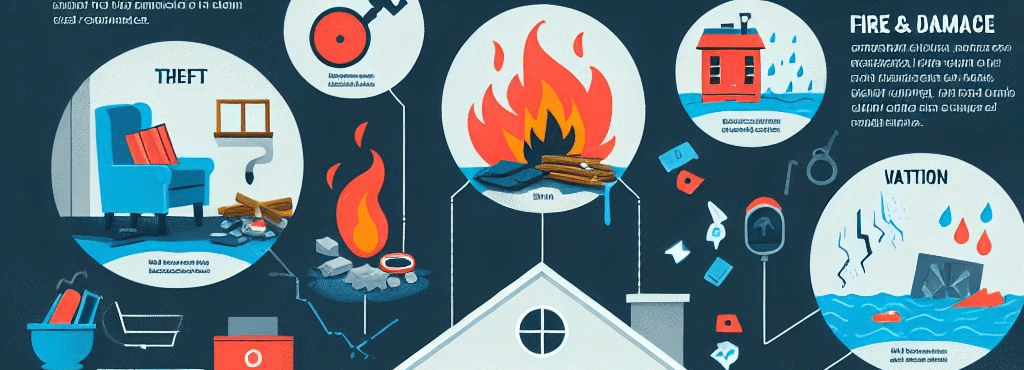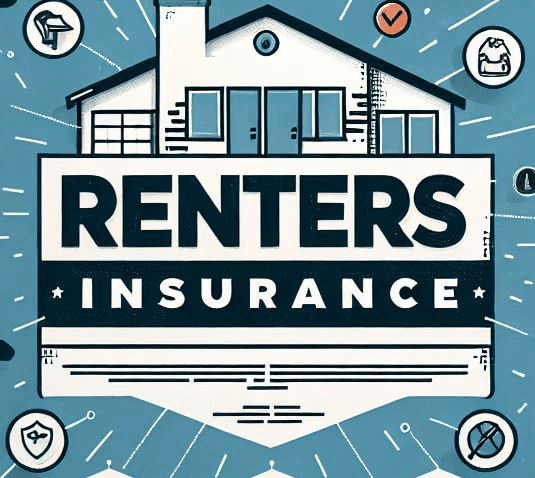Renters insurance is a type of property insurance policy designed to protect individuals who rent their homes. It protects tenants who live in a rented dwelling. Policies cover personal property, liability claims, and additional living expenses when a unit is damaged. Although it isn’t a legal requirement, some landlords require proof of renters insurance before they hand over the 3 keys.
You can get renters insurance for short-term rentals, but it often requires specific coverage. It’s important to check with your insurance provider to understand the specific coverage options and any exclusions that may apply. Here are some options:
- Short-Term Rental Insurance: This type of insurance is designed to cover your property and liability exposure when you rent out your home to paying guests for short periods, typically under a month12. It can be purchased as a separate policy or as an endorsement to your existing renters or homeowners insurance.
- Home-Sharing Insurance: Some insurance companies offer home-sharing insurance, which provides coverage for short-term rentals through platforms like Airbnb or Vrbo. This can include guest liability insurance, property damage, and theft.
- Travel Insurance: If you are a guest staying at a short-term rental, your existing renters or homeowners insurance may provide some coverage, but you might also consider travel insurance for additional protection. CNA insurance reviews
Renters Insurance Cost-How much is renters surance?
The cost of renters insurance can vary based on several factors, including the amount of coverage, location, the insurance provider, and any additional coverage options you choose. The average cost of renters insurance in the United States is $15 per month, or $180 per year, according to 2024 data from Experian. Here are some average costs for renters insurance:
| Coverage Amount | Average Annual Premium | Average Monthly Premium |
|---|---|---|
| $15,000 | $157 | $13 |
| $30,000 | $199 | $17 |
| $50,000 | $260 | $22 |
What does renters insurance cover and not cover
Renters insurance typically cover Personal Property, Liability and Medical Payments to Others. However, it does not cover damage to the building structure itself (which is the landlord’s responsibility), your roommate’s belongings, or damage caused by certain natural disasters like floods or earthquakes unless you have additional coverage. Erie homeowners insurance
What does renters insurance cover
- Personal Property: This includes your belongings such as furniture, electronics, clothing, and other personal items. Coverage usually applies to damage or loss caused by events like fire, theft, vandalism, and certain types of water damage.
- Liability: If someone is injured while in your rental property, or if you accidentally cause damage to someone else’s property, renters insurance can help cover legal expenses and damages.
- Medical Payments to Others: This covers medical expenses for guests who are injured on your property, regardless of who is at fault.
- Additional Living Expenses: If your rental becomes uninhabitable due to a covered event (like a fire), renters insurance can help pay for temporary housing and other additional living expenses
what does renters insurance not cover
- Structural Damage: Damage to the building itself is usually the landlord’s responsibility.
- Roommate’s Belongings: Unless your roommate is specifically named on your policy, their belongings are not covered.
- Certain Natural Disasters: Events like floods, earthquakes, and landslides are generally not covered unless you purchase additional coverage.
- Pest Infestations: Damage caused by pests such as bed bugs, rodents, or termites is typically excluded.
- Wear and Tear: Normal wear and tear or maintenance issues are not covered.
- High-Value Items: Items like expensive jewelry, art, or collectibles may have limited coverage unless you add a rider to your polic.
Renters Insurance Limits
renters insurance policies often have specific limits on certain categories of items. These limits are known as “sublimits” and they cap the amount the insurance company will pay for losses in these categories. Here are some common examples:
| Category | Limit |
|---|---|
| Jewelry | $1,000 to $2,500 |
| Electronics | $1,500 to $2,500 |
| Firearms | $2,000 |
| Cash | $200 |
| Collectibles | $1,000 |
| Furs | $1,000 to $2,500 |
If you own high-value items that exceed these sublimits, you can often purchase additional coverage, known as a “rider” or “floater,” to ensure they are fully protected.

Renters Insurance Pros and Cons
Pros of renters insurance
- Protection of Personal Property: Covers your belongings against damage or loss due to events like fire, theft, and vandalism.
- Liability Coverage: Helps cover legal expenses and damages if someone is injured in your rental property or if you accidentally cause damage to someone else’s property.
- Affordable: Renters insurance is generally inexpensive, with average premiums around $15-$20 per month.
- Additional Living Expenses: Covers costs like hotel stays and meals if your rental becomes uninhabitable due to a covered event.
- Peace of Mind: Provides reassurance that your belongings and potential liabilities are covered.
Cons of renters insurance
- Does Not Cover Everything: Certain natural disasters like floods and earthquakes are typically not covered unless you purchase additional coverage.
- Deductibles: You may have to pay a deductible before your insurance kicks in, which can be a financial burden.
- Limited Coverage for High-Value Items: Items like expensive jewelry or art may have limited coverage unless you add a rider to your policy.
- Exclusions: Damage from pests, wear and tear, and your roommate’s belongings are usually not covered.
Renters Insurance Claims
The most common renters insurance claims typically include:
- Theft: Coverage is often sought for stolen personal items like electronics, furniture, and clothing.
- Fire and Smoke Damage: Claims for damages caused by fires, including smoke damage, are frequent.
- Water Damage: This includes damage from burst pipes, leaks, or other water-related incidents.
- Vandalism: Damage caused by vandalism or malicious mischief is also a common claim.
- Natural Disasters: While not always covered under standard policies, claims can be made for damage caused by events like hurricanes, tornadoes, and earthquakes if additional coverage is purchased.
If you need to file a renters insurance claim, here are the steps you should follow:
- File a Police Report (If Necessary): If your claim involves theft, vandalism, or any criminal activity, contact the police and file a report. Your insurance company will likely require a copy of this report.
- Notify Your Landlord: Inform your landlord about the incident, especially if it involves damage to the property. This is often required by rental agreements.
- Contact Your Insurance Company: Reach out to your renters insurance provider as soon as possible to report the claim. They will guide you through the process and provide the necessary forms.
- Document Your Losses: Make a detailed list of all damaged or stolen items. Take photos or videos of the damage and gather any receipts or proof of ownership you have.
- Make Temporary Repairs: If there are any immediate repairs needed to prevent further damage (like covering a broken window), make them and keep the receipts. Your insurance may reimburse you for these costs.
- Complete the Claim Forms: Fill out the claim forms provided by your insurance company. Be thorough and accurate in your descriptions.
- Update Your Home Inventory: After filing the claim, update your home inventory to reflect any changes in your belongings.
How long does the claims process take?
After you file a claim, an adjuster will usually contact you within a few days to gather more information. The time it takes to review your claim can vary. Simple claims might be processed within a few days, while more complex claims could take a few weeks. Once the claim is approved, the payment process can take anywhere from a few days to a couple of weeks. Overall, the entire process can take anywhere from a few days to several weeks, depending on the specifics of your claim and how quickly you provide the necessary information.
Several factors can delay the renters insurance claims process. To help expedite your claim, ensure you have all necessary documentation, communicate regularly with your insurance provider, and make any temporary repairs to prevent further damage.
Common Reasons for Renters Insurance Claim Denials
there are several common reasons why renters insurance claims might be denied. Understanding these common reasons can help you avoid pitfalls and ensure a smoother claims process.
- Lack of Documentation: Failing to provide necessary documentation, such as receipts, photos, or police reports, can lead to a claim denial.
- Policy Exclusions: Claims for events or items not covered by your policy, such as certain natural disasters or high-value items without additional coverage, are often denied.
- Incorrect Information: Providing inaccurate or incomplete information when filing a claim can result in denial.
- Late Filing: Waiting too long to file a claim after an incident can cause it to be denied.
- Failure to Mitigate Damages: Not taking steps to prevent further damage after an incident, such as making temporary repairs, can lead to a denial.
- Unlisted Individuals: If someone not listed on your policy is responsible for the damage or loss, the claim may be denied.
Common Misconceptions
- “Renters insurance is too expensive.” In reality, renters insurance is quite affordable, with average premiums around $15-$20 per month.
- “My landlord’s insurance will cover my belongings.” Your landlord’s insurance typically only covers the building itself, not your personal property.
- “I don’t own enough valuable items to need insurance.” Most people underestimate the value of their belongings. Replacing everything after a loss can be very costly.
- “Renters insurance covers everything.” While renters insurance covers many things, it doesn’t cover everything. For example, damage from floods or earthquakes usually requires additional coverage.
- “Renters insurance only benefits the tenant.” Renters insurance can also benefit landlords by reducing the risk of disputes and potential liability issues.


Leave a Reply